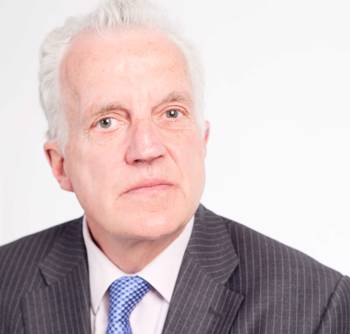
As a lad, Christian Wolmar was a self-confessed train spotter who used to stand at the end of Euston station or take the train to Willesden junction to watch the trains go by.
He also used to “bunk the sheds,” rampaging around sheds full of steam engines at a time when no-one cared a bit for health and safety.
And then, around fifteen, everything changed as Wolmar started to get interested in girls.
“If you are at a dance and they say what’s your favourite hobby and you say train-spotting, it’s not a great chat-up line, so I gave it up,” says Wolmar.
It was, however, perhaps not a total coincidence that many years later, he became transport correspondent of The Independent and made a name for himself covering Prime Minister John Major’s privatisation of British Rail.
Ever since then, the railways, in the UK and around the world, have been at the heart of Christian Wolmar’s journalistic career. He has been a columnist for the fortnightly Rail Magazine since 1995, has written what must be a record-breaking 23 books on railways and, to this day, is a go-to broadcasting pundit on the current summer of discontent and strikes on the rail network.
It is a combination that has produced a decent living for Wolmar who has been a freelance since 1997.
Lack of expertise
From his long established perch, Wolmar now fears that a decline in the number of newspapers who can afford to employ specialist correspondents in areas like transport has led to an erosion of experience and accumulated knowledge.

“There was a little coterie of four of five transport correspondents and we were all mates who used to hunt down stories together and we would get brown paper envelopes from disgruntled British Rail managers who wanted to publicise the worst inequities of privatisation,” Wolmar remembers.
“That coterie had real experience, knowledge and contacts and I suppose that’s something that has greatly been lost,” adds Wolmar although The Guardian and The Times are among those which still have transport specialists.
His point is a more general one on the decline of specialists such as the social services, labour and industrial correspondents as opposed to generalists who have to jump into the next story that comes along. Reporters who really know their fields can better, he believes, hold society and politicians to account.
“I think that is a terrific loss and I find that when interviewed about the strikes, people make the most daft assumptions. They don’t know the difference between ASLEF and the RMT or the ins and outs of the history of the story and that’s a great change to journalism compared with the past,” the former train spotter says.
Strike coverage
Wolmar finds the coverage of the current industrial situation “pretty shallow” with some journalists still highlighting train drivers who get lots of money even though the drivers have not gone on strike and there is little knowledge of the history of the union that has been on strike, the RMT.
“There is very little knowledge about the history of the RMT and the fact that its very riven and split between a bunch of head-bangers and a bunch of fairly sensible people like Mick Lynch,” says the former Independent journalist.
“Lynch is a matter of fact intelligent guy who knows his stuff and low and behold he becomes a media star and that says it all,” he adds.
Wolmar gets exasperated when the right wing national newspapers portray the RMT as a crazy left-wing union and sees elements of desperation in their wider political coverage.
“When the Daily Mail puts on its front page: ‘Labour Isn’t Working’ – hold on a minute. Labour hasn’t been in power since 2010,” says Wolmar who campaigned unsuccessfully for the Labour nomination for London Mayor and was the Labour candidate in the 2016 Richmond Park by-election won by the Lib Dems.
There is at least a strong business press covering the railway industry with the monthly Modern Railways as well as Rail Magazine.
It is, he believes, a well-informed business press which a lot of industries have lost, largely because there are two constituencies, B2B and train-spotters and the train-spotters help to subsidise the serious business and political content.
A flawed model
In a curious way, the UK railways and Christian Wolmar’s coverage have come full circle. At the time, he pointed out all the internal contradictions in the government’s privatisation plans which have continued to the present day.
You have on the one hand Network Rail, which is in charge of the transport and the infrastructure, and then around twenty train operators who run the trains in the form of franchises, an idea that was incompatible with what the Treasury most wanted – competition. Then there were rolling stock companies and engineering companies and sitting on top of the structure, a Department of Transport taking “an almost unnatural interest in the affairs of the railway”, micro-managing to a greater extent even than with British Rail.
“You couldn’t have competition because people would obviously cherry-pick the profitable services and not run the others so the very heart of this was flawed from the outset but nonetheless the government proceeded with this totally flawed model,” Wolmar argues.
Roll forward nearly 25 years and Wolmar is writing in the Financial Times arguing that the one thing the recent rail strike has told us is that no-one is in charge of the railways.
“And that, as we have seen, is a recipe for chaos. While the unions clearly represent the workers, who speaks for the railways? Transport Secretary Grant Shapps claims it is nothing to do with him, while the train operators suggest in private that they have to ask his department for permission to sneeze,” Wolmar says.
He goes further and claims Shapps is not very interested in railways but is very keen to make political capital out of things like the dispute.
“One of the things that really annoys me about Grant Shapps is that he talks about dodgy British Rail sandwiches. It is totally untrue. BR sandwiches were actually pretty good. It was only a Two Ronnies joke about curly-edged sandwiches that sat on the counter all day,” says Wolmar.
Even though Shapps was happy to revive the joke, Wolmar asks why you would judge a transport system by the quality of its sandwiches anyway – rather like judging the quality of a meal at The Ivy by the quality of the taxi ride on the way there.
The poor quality of BR sandwiches is one of the myths debunked by Wolmar in his latest book, British Rail: A New History.
Another is the bad excuses BR management allegedly made for train delays, such as trains being held up by “the wrong kind of snow”.
According to Wolmar, no BR manager ever used the phrase and, in fact, it was made by a Today presenter, although the ultimate railway specialist notes that a particularly cold type of snow can cause difficulties.
Ironically, Wolmar believes in its last decade before privatisation, British Rail was innovative and being run very efficiently and that it was broken up when it had reached probably its best operational model “solely for ideological reasons”.
Wolmar believes there will be a settlement to the current dispute at a slightly higher level than the government would like although the process could be speeded up if there was a ban on compulsory redundancies.
“BR shed 10,000 jobs a year for every year of its 50-year existence – from 650,000 to 150,000 at privatisation – and they did that without compulsory redundancies,” Wolmar explains.
The return of rail
As he surveys the world of railways, Wolmar sees an industry that in general is flourishing and growing.
There was a post-war period when the conventional wisdom was that the railways were a dying industry. It was, after all, a 19th century invention stuck on rails and therefore inconvenient because it couldn’t offer door-to-door service.
Lines were closed down and not just in the UK. Now the reverse has happened. Underground systems are being build around the world and London has just been knocked out of the Top Ten in the World by Chongqing, a Chinese city with a population of 31 million. Tram systems are also on the march.
According to Wolmar, apart from underground and tram, three other types of railway systems are flourishing – suburban, inter-city and heavy freight. Regional services between smaller towns and smaller parcels are struggling.
Despite his obvious love of railways, Wolman was an opponent of the £100 billion HS2 railway now being constructed. It was an unnecessary diversion of resources from other ways of improving existing railway services.
The only time Wolmar bristles is when faced with any suggestion that some services might not be commercially viable.
“Railways don’t have to be commercially viable in the same way that roads don’t have to be commercially viable. The railways are a service. They have a commercial and a social side,” Wolmar insists.
Increasingly, any money needed from the government to support the railways is money well spent because the externalities, as the economists have it, are positive for railways – the benefits are not just for the people travelling on them but for other people as well as for taking traffic off the roads.
His greatest dream, of course, would be to be transport secretary in a Starmer government, although age, at 73, is starting to tell against the former Independent transport correspondent.
If it were to happen – and it would probably now take a peerage – he would divert resources from grand projects into improving existing services and encouraging cycling and walking.
Even if he never makes it to the Department of Transport, the railways and his coverage of them have carried the lad who once wandered among steam trains in the engine sheds, a long way.

Christian Wolmar’s new book, British Rail: A New History, is available to buy on Amazon.
This article was first published in InPublishing magazine. If you would like to be added to the free mailing list to receive the magazine, please register here.












